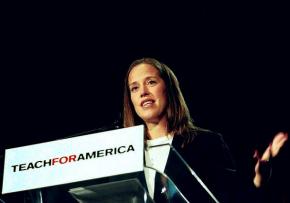“Teach for Awhile” falls short
Earlier this month, the Seattle School Board voted 6-1 to approve an agreement to allow hiring of some Teach For America graduates in the city's schools, despite having laid off hundreds of public school teachers in recent years.
Teach for America is a teacher training program through which young people interested in becoming teachers spend just five weeks of summer training, after which they begin teaching--often committing to work in some of the neediest schools in the U.S. But critics point out that five weeks is not enough training and that the program can force out experienced teachers, lead to a higher turnover rate and weaken teachers' unions.
, a history teacher at Seattle's Garfield High School, founding member of Social Equality Educators and graduate of the Teach for America program, looks at why Seattle students and teachers deserve better.
FROM 2001 to 2003, I "taught for America."
After graduating from college, I headed for the Bronx in New York City, where I underwent Teach for America's (TFA) "teacher boot camp." With just five sleepless weeks of on-the-job training teaching summer school to fourth-graders, team meetings and night classes, I was given the stamp of approval and shipped off to Washington, D.C.
The Seattle School Board recently voted to bring TFA to our school district. But they should consider the lessons of my experience.
At 21, I found myself in a public elementary school in the ghetto of South East Washington, D.C.--in a classroom with a hole in the ceiling that caused my room to flood, destroying the first American history project I ever assigned the students.
One lasting memory came on my third day of teaching sixth grade.
I had asked the students to bring a meaningful object from home for a show-and-tell activity. We gathered in a circle and the kids sat eagerly waiting to share their mementos. One after another, each and every hand came out of those crumpled brown lunch sacks, clutching a photo of a close family member--usually a dad or an uncle--who was either dead or in jail.

By the time it was my turn, all I could do was stare stupidly at the baseball I pulled out and pick nervously at the red stitches.
Working in the "other America" was a personally powerful experience and made me decide to dedicate my life to finding a solution to transform public education and the broader society that would allow such neglect to occur.
But while TFA allowed me this window into the problems of our country, it didn't prepare me to address these challenges. With only five weeks of training, it wasn't just that I was not equipped to differentiate instruction to meet the needs of students with a wide range of ability levels, create portfolios that accurately assessed student progress, or cultivate qualities of civic courage--it was that I didn't even know that these things were indispensable components of an effective education.
AS WELL, TFA often overemphasizes the importance of test scores, driving corps members to narrow the curriculum to what's on the test to prove that they are effective teachers. Yet even by this measure, TFA-ers don't make the grade.
Consider a six-year study of TFA out of Stanford University that looked at more than 4,000 teachers and 132,000 students on six different tests and found not one case where TFA educators performed as well as certified teachers.
Moreover, TFA's own statistics show that a mere 33 percent continue teaching after their two-year commitment--creating high turnover in the very schools that most need the continuity and stability.
Seattle has an abundance of teachers with teaching certificates and master's degrees struggling to get a teaching position in the local public schools--West Seattle Elementary School, a target school for TFA, had some 800 applicants for a single job. Why bring in undertrained TFA recruits when we have so many young teachers in Seattle who have spent years developing their skills?
TFA is being presented as a solution to the problems in our public schools. But the reality is, in this era of cash-strapped school districts, officials are lured not by the quality of TFA-ers but by the fact that young teachers who leave the district and make room for more young teachers provide an inexpensive alternative to investing in more experienced teachers who will earn a higher salary.
Yet, if the Seattle school district truly wants "excellence for all," it will need highly trained teachers who have a lasting commitment to the profession--not the revolving door that has come to be known as "Teach for Awhile."


